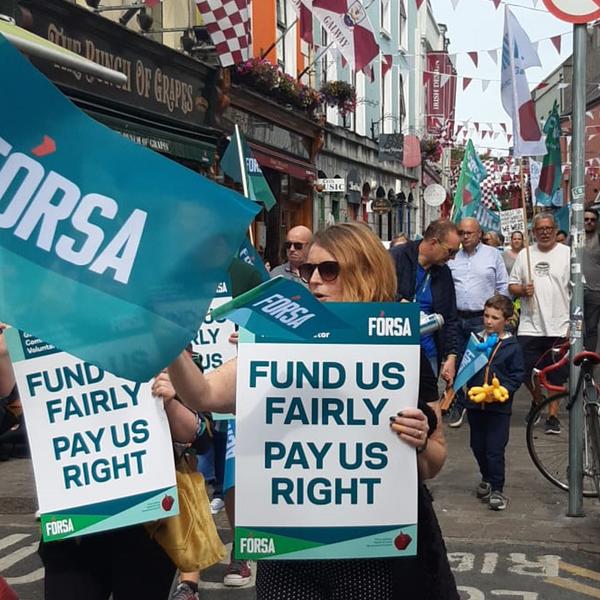
Socialists - Get Active In Your Unions!
25 September 2024
Forsa, the trade union representing most civil and many public servants in Ireland, published details from their 2024 member survey this week. The union said the survey received more than 25,500 responses and indicates “top issues of concern” for workers and how we workers might vote in an upcoming general election.
The publicly available data is limited on granular detail, but provides “top-line results” suggesting that many public sector workers favour a moderately progressive agenda with demands for material benefits to the working class.
Unsurprisingly, an overwhelming majority, 84%, said: “pay improvement is a key issue in considering how to vote in the next election.”
60% of respondents said they “are also willing to vote for those that commit to pay increase negotiations,” which is a low bar as far as political commitments but around half consider pay increases to mean those that would go beyond the rate of inflation.
In other words, an increase in real terms and not just a nominal increase, which many public sector workers receive as part of national agreements and increment scales.
The survey also shows widespread worker support for improved quality of life, cost of living measures and public services in the areas of housing, health, and affordable childcare.
Large majorities support a four-day working week, a referendum to keep water services in public ownership, increased investment in community health services, more affordable childcare, and 77% believe the housing crisis has worsened since the last election, especially among members aged 35 and under.
Under the leadership of Kevin Callinan, Forsa is a carefully managed project that successfully merged three separate unions (CPSU, PSEU, and Impact) in 2018 to become a massive organisation of more than 85,000 workers.
Recently, a slight majority have only ever been members of Forsa, which means the union is coming into its own with a distinct identity. As the responses to the survey indicate, Forsa membership express a broadly social democratic and progressive perspective.
This is further evidenced by the frequent presence of Forsa members at marches and demonstrations in solidarity with Palestine. We’ve also seen members joining protests to combat the rise of far-right - particularly standing in solidarity with fellow union members in libaries. Many workers understand the far right pose a threat to the working class and to minorities.
It is my own opinion that this kind of participation has been predominantly member-led, although there are elements of Forsa staff that are very supportive.
But organising on a massive scale or handing over control of the union to its workplace leaders is not a priority and is easily stymied by bureaucratic slow-walking, constrained legalistic approaches and institutional holdovers from more explicit forms of social partnership with the State.
It is also worth noting that it is in the basic material interest of public sector workers to be broadly in support of more public investment and State-involvement. There is a general lack of politics in the union.
This is not surprising for public sector workers as many are limited in their ability to participate fully in the political life of the country. Party membership, public statements outside of explicitly supported union activities and support for certain ideologies can draw unwanted attention from management including disciplinary actions.
But there is a growing understanding within both the rank and file and even the leadership that decades of partnership have had a compounding effect of worse deals for workers, declining union membership and falling worker militancy.
This stems from a strategy of capitulation because the default position has been to negotiate from a position of weakness because fighting and potentially losing carries too much of a risk. This is a self-fulfilling prophecy, though, as refusing to fight, or at least starting building the capacity to fight, means capitulation and negotiating from weakness remains the only option.
If you fight you can also win!
For the leadership not sticking your neck out on radical politics is justified with the excuse you run the risk of alienating members who might have fallen for the myth that the Irish State is impartial and objective, and not an extension of the ruling class and the political parties that represent it.
But running away from politics, especially since the rank and file are overwhelmingly progressive and broadly social democratic on many key issues, risks demoralising workers whose only option to participate in the social and political processes of the country is through their unions.
The Irish Congress of Trade Unions (Congress), the umbrella organisation that covers most unions in Ireland and leads on public sector agreements, reflects this broad social democratic position in their Budget Submission 2025 “Building a Better Economic Future.”
Much of what Congress proposes are merely small technical adjustments to taxes along with standard calls for increased and improved investment in housing, health, and education.
The emphasis, however, is on growth and productivity in the economy with provisions for popular but abstract calls for “inclusion”, “sustainability” and improved care supports. The submission also calls for a policy framework that encourages collective bargaining, positioning union officials to have some influence decision making - bringing them into the corridors of power.
Socialists should know that, while some of the proposals are decent and might bring moderate material gains to workers, nibbling around the edges and bargaining with the capitalist state only gets us so far. The era of partnership has been one of negotiated retreat.
Gains can always be reversed whether due to reactionary government policy, changing economic conditions, sabotage by the national and multinational capitalist class, and other crises and shocks from factors like climate change and war.
The Labour Party has used control of many of our unions to force workers to accept cuts during the crisis years.
Socialists should be prepared to argue that the tame positions and programmes of organised labour are not principled programmes based on any model to really change society. The idea of the worker movement seizing control of its own destiny and liberating workers from the cyclical crises of capitalist exploitation and democratic rollback are mocked by the union tops.
What Congress proposes is merely a menu of options that are up for “negotiation”. A labour movement that is not a worker movement, and a worker movement without the involvement of socialists, is destined to play a cynical game at the boss’s negotiating table - the rules of which are rigged.
Socialists should push the unions to fight on the more ambitious proposals they make - for example on housing. Socialists need to be involved in pushing on the bosses, on the State and on union leaders to make concessions or win on issues that benefit the working class.
But we can’t fool ourselves or our comrades. Congress is telegraphing that they are willing to work with whatever government comes out of the next election so long as it is willing to meet them half way on some of the issues it highlights in its budget submission.
Some of these, might even end up getting put in by ruling Fianna Fáil Fine Gael Green coalition to buy workers’ votes and demobilise those who have been left worse off after decades of neoliberal policies and union retreat.
In Forsa, the small internal reform group of socialists called “Forsa Left” have made gains in calling for a fighting union, putting the workers at the centre of policy and strategy and organising militant grassroots leaders.
Every union needs a rank and file opposition group like this to help put a shape on demands for union officials to actually use the power of organised labour to change society, not just focus on small changes to contracts and settling for pay agreements that fall well short of inflation.
As public sector workers, we are also in a position to fight and begin having conversations about the nature of the State under capitalism and what a state might look like when it is in the service of the workers movement.
Congress, for example, should listen to calls from around the country and use Raise the Roof to organise a large housing demonstration, not as a grand day out, but as a reinvigorated movement for radical changes in housing policy led by workers and their demands.
Three-quarters of Forsa’s members have told its leadership that housing is a major issue for workers, which means the union and its general secretary Kevin Callinan already have a mandate to get people organised and mobilised.
At the national Forsa conference this past spring, the union all but called for the complete adherence to Boycott, Divestment, and Sanction of the State with respect to the genocidal apartheid state of Israel.
As Israel’s war deepens and broadens in the middle east, these demands of the members cannot be left to wither on the vine. A challenge to the State on housing, health, international solidarity, anti-fascism, and the power of militant organised labour would have massive knock-on effects for the education of the worker movement and its enthusiasm for tangible, structural change.
It would also bring workers in direct confrontation with the limits of reform and the inevitable reaction from liberals who might pay lip-service to the demands of ordinary people when they need their votes.
Without socialists fighting shoulder to shoulder with the most militant trade unionists and bringing revolutionary politics back to the unions, most of what the likes of Congress or Forsa put down on paper will stay there.
Our class is powerful. We need unions that use that power to change this country.
 RED NETWORK
RED NETWORK